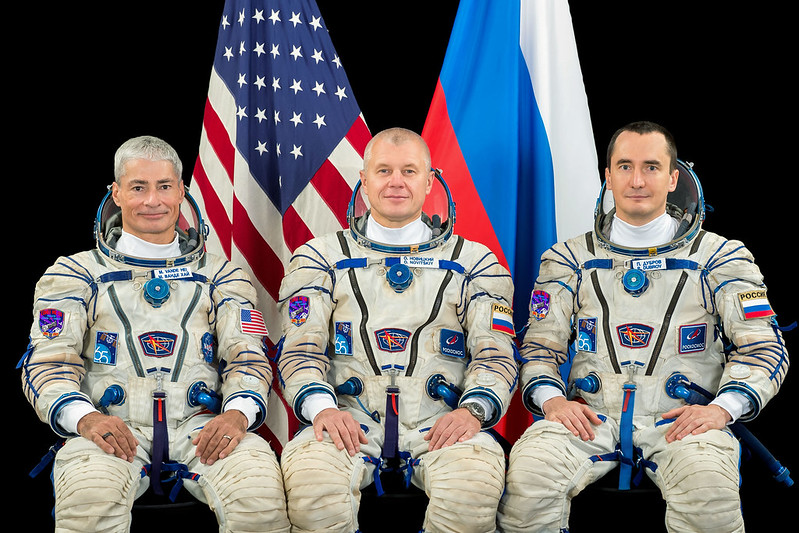NASA astronaut Mark Vande Hei could spend a year in space

Breaking space news, the latest updates on rocket launches, skywatching events and more!
You are now subscribed
Your newsletter sign-up was successful
Want to add more newsletters?

Delivered daily
Daily Newsletter
Breaking space news, the latest updates on rocket launches, skywatching events and more!

Once a month
Watch This Space
Sign up to our monthly entertainment newsletter to keep up with all our coverage of the latest sci-fi and space movies, tv shows, games and books.

Once a week
Night Sky This Week
Discover this week's must-see night sky events, moon phases, and stunning astrophotos. Sign up for our skywatching newsletter and explore the universe with us!

Twice a month
Strange New Words
Space.com's Sci-Fi Reader's Club. Read a sci-fi short story every month and join a virtual community of fellow science fiction fans!
NASA astronaut Mark Vande Hei may spend a year in space after his launch in April — and if that's the case, he'll welcome the opportunity, Vande Hei said Monday (March 15) in his first news conference since NASA announced his flight last week.
Typically, astronauts spend about six and a half months on the International Space Station, living and working in orbit. But a separate project of NASA's Russian counterpart, Roscosmos, could mean that Vande Hei must remain in space longer before he can catch a ride back to Earth. If so, that would be just fine with him, he told reporters in a televised news conference on NASA TV on Monday.
"Honestly, for me, it's just an opportunity for a new life experience," he said during the news conference, which was held virtually from Star City, Russia, where he is preparing for flight. "I've never been in space longer than about six months, so if someone tells me I got to stay in space for a year, I'll find out what that feels like. I'm really enthusiastic about it."
Related: Here's how NASA just booked a last-minute trip to space on a Russian Soyuz
Vande Hei has visited the space station once before, flying to and from the orbiting lab on a Russian Soyuz vehicle in 2017 and 2018 to complete a six-month stay; that experience made a longer flight appealing, he said. "On the previous flight, it felt like every day got a little bit easier," he said during the news conference. "I was more comfortable with things as time went on, I was much more familiar with my work."
Vande Hei has already been embracing chance when it comes to his upcoming mission: He learned next month's launch was confirmed only last week, along with the rest of the world, he said during the media event.
For the past decade, NASA astronauts have been flying to the International Space Station on Russian Soyuz capsules in seats that the agency buys from its counterpart, Roscosmos. Now, NASA is beginning to launch its astronauts on U.S. commercial vehicles like SpaceX's Crew Dragon, but it doesn't want to stop flying on Soyuz.
Breaking space news, the latest updates on rocket launches, skywatching events and more!
To that end, NASA spent the past few months hastily arranging for a seat on the April Soyuz flight, dubbed MS-18, this time through Texas-based space tourism company Axiom Space rather than directly through Roscosmos. In exchange for the April launch, NASA will fly an astronaut selected by Axiom on an upcoming commercial flight, likely in 2023, according to an agency statement about the arrangements.
An extended stay would mark a second irregularity in Vande Hei's mission, one prompted by scheduling on the side of Roscosmos. The agency is partnering with a Russian television channel to film a movie in space, which would require flying two people to the space station for filming.
Previous Roscosmos statements have suggested that may occur in the fall. If that schedule holds true, Vande Hei will have to wait until the next visiting Soyuz — MS-19 — heads for home, rather than flying back to Earth in the same vehicle he launched in, as astronauts typically do.
"It all depends … on whether or not those tourists go up on the spacecraft in the fall, because they would take my seat back, so I'd have to stay longer to wait for another seat," Vande Hei said during the news conference.
He didn't specify whether he'll know the length of his stay before launch; the last NASA astronaut to conduct an extended mission, Christina Koch, learned of her extension when she was already in orbit. (Koch spent 328 days in space in 2019 and 2020, making her visit the second-longest mission for a U.S. astronaut. Scott Kelly set the current record when he returned from a 340-day mission in 2016.)
"My perspective is I'm going back to a job and instead of being a new employee that just showed up, I'm going to be somebody who worked there in the lab a couple years ago," Vande Hei said. "I'll start off a little better than I was the first time and I'll get to continue at that job longer, so hopefully I'll be able to contribute even more."
Email Meghan Bartels at mbartels@space.com or follow her on Twitter @meghanbartels. Follow us on Twitter @Spacedotcom and on Facebook.

Meghan is a senior writer at Space.com and has more than five years' experience as a science journalist based in New York City. She joined Space.com in July 2018, with previous writing published in outlets including Newsweek and Audubon. Meghan earned an MA in science journalism from New York University and a BA in classics from Georgetown University, and in her free time she enjoys reading and visiting museums. Follow her on Twitter at @meghanbartels.
